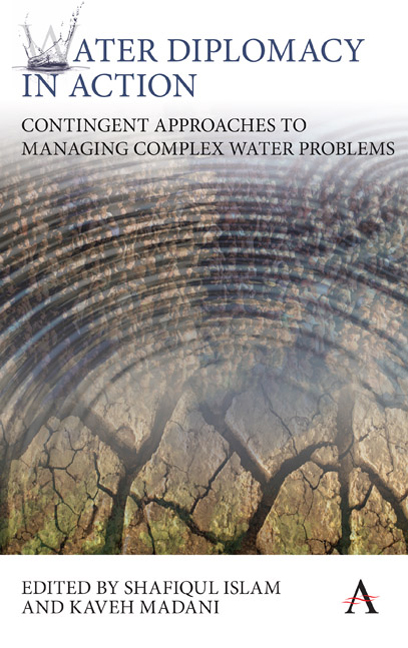Book contents
- Frontmatter
- Contents
- List of Figures
- List of Tables
- The Blind Men, the Elephant and the Well: A Parable for Complexity and Contingency
- Preface
- Part I ROOTS AND CAUSES OF COMPLEXITY AND CONTINGENCY IN WATER PROBLEMS
- Part II TOOLS, TECHNIQUES, MODELS AND ANALYSES TO RESOLVE COMPLEX WATER PROBLEMS
- Chapter Three Ten Bankruptcy Methods for Resolving Natural Resource Allocation Conflicts
- Chapter Four Flexible Design of Water Infrastructure Systems
- Chapter Five Extreme Value Analysis for Modeling Nonstationary Hydrologic Change
- Chapter Six The Water– Food Nexus and Virtual Water Trade
- Chapter Seven A Hybrid Analytical Approach for Modeling the Dynamics of Interactions for Complex Water Problems
- Chapter Eight A Call for Capacity Development for Improved Water Diplomacy
- Chapter Nine Water Complexity and Physics- Guided Data Mining
- Part III CASE STUDIES
- Notes on Contributors
- Index
Chapter Eight - A Call for Capacity Development for Improved Water Diplomacy
from Part II - TOOLS, TECHNIQUES, MODELS AND ANALYSES TO RESOLVE COMPLEX WATER PROBLEMS
Published online by Cambridge University Press: 10 January 2018
- Frontmatter
- Contents
- List of Figures
- List of Tables
- The Blind Men, the Elephant and the Well: A Parable for Complexity and Contingency
- Preface
- Part I ROOTS AND CAUSES OF COMPLEXITY AND CONTINGENCY IN WATER PROBLEMS
- Part II TOOLS, TECHNIQUES, MODELS AND ANALYSES TO RESOLVE COMPLEX WATER PROBLEMS
- Chapter Three Ten Bankruptcy Methods for Resolving Natural Resource Allocation Conflicts
- Chapter Four Flexible Design of Water Infrastructure Systems
- Chapter Five Extreme Value Analysis for Modeling Nonstationary Hydrologic Change
- Chapter Six The Water– Food Nexus and Virtual Water Trade
- Chapter Seven A Hybrid Analytical Approach for Modeling the Dynamics of Interactions for Complex Water Problems
- Chapter Eight A Call for Capacity Development for Improved Water Diplomacy
- Chapter Nine Water Complexity and Physics- Guided Data Mining
- Part III CASE STUDIES
- Notes on Contributors
- Index
Summary
Abstract
Capacity development is a critical component of water diplomacy, navigating the complexities of transboundary water conflicts. Performed at the institutional and personal levels, capacity development can include initiatives to improve the practitioner's technical capabilities in water resources management, understanding of international water law, interpersonal communications and dispute resolution. One example of capacity development that interweaves society, institutional and individual capacities is the effective use of methods of public participation, by which communities that are impacted by transboundary water policy become critical voices in the decision- making processes. In this chapter we discuss the individual, institutional and societal levels of capacity development and their basin- wide implications for improved outcomes in water diplomacy.
Introduction
Anything else you're interested in is not going to happen if you can't breathe the air and drink the water. Don't sit this one out. Do something.
(Carl Sagan)Water management is conflict management. There is no such thing as managing water for a single purpose because all water management is multi- objective and based on navigating competing interests. These interests include domestic users, agriculturists and environmentalists— any two of which are regularly at odds— and the chances of finding mutually acceptable solutions drop exponentially as more stakeholders are involved. Add international boundaries and the chances decrease exponentially yet again. (MacQuarrie et al. 2008, 176) Within each international basin, demands from environmental, domestic and economic users increases annually, while the amount of freshwater in the world remains roughly the same, as it has been throughout history. Given the scope of the problems and the resources available to address them, avoiding water conflict is vital. In international waters, the promising trend reveals a record of acute conflict over international water resources overwhelmed by a record of cooperation. Despite the tensions inherent in the international setting, riparians have shown tremendous creativity in approaching regional development, often through preventive diplomacy, and the creation of “baskets of benefits,” which allow for positive- sum, integrative allocations of joint gains (MacQuarrie et al. 2008, 177). It is in preventive diplomacy and cultivating the creativity to develop baskets of benefits where capacity building becomes an invaluable tool for improved water diplomacy.
- Type
- Chapter
- Information
- Water Diplomacy in ActionContingent Approaches to Managing Complex Water Problems, pp. 141 - 154Publisher: Anthem PressPrint publication year: 2017



